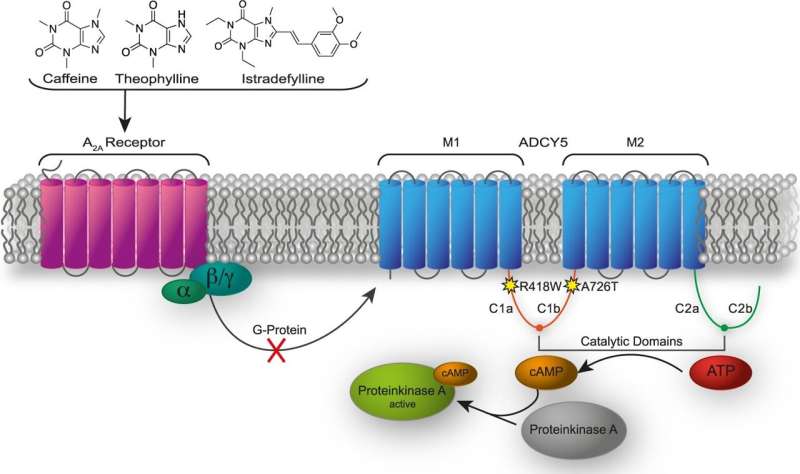This article has been reviewed according to Science X's editorial process and policies. Editors have highlighted the following attributes while ensuring the content's credibility:
fact-checked
peer-reviewed publication
proofread
Rare genetic disease: Researchers discover new treatment for ADCY5-related dyskinesia

The movement disorder ADCY5-related dyskinesia can be treated with the asthma drug theophylline. This has been shown in a recent study by Martin Luther University Halle-Wittenberg (MLU), University Medicine Halle and University of Leipzig Medical Center.
In the journal PLOS ONE, the researchers describe the case of a child with this disease whose symptoms improved significantly with the drug. ADCY5-related dyskinesia is an extremely rare disorder that causes dyskinesia and uncontrolled movements in affected individuals. Currently, there is no cure for this disease.
ADCY5-related dyskinesia is caused by defects in the ADCY5 gene. "Just one error in the genetic code of this gene can have devastating consequences," says Professor Andrea Sinz from the Institute of Pharmacy at MLU. In the case of ADCY5-related dyskinesia, the genetic defect causes a specific enzyme in the cells to become overactive. This enzyme is involved in the production of the second messenger "cAMP."
In those affected, too much "cAMP" tends to lead to uncontrolled movements, dyskinesia, and many other symptoms, such as speech deficiencies, starting in early infancy. The disease is considered very rare. According to estimates by the US National Institutes of Health, between one and 300 people are living with the disease in the United States; however, more precise numbers are not available.
"Rare diseases like ADCY5-related dyskinesia are often not recognized and accurately diagnosed," says Sinz. The symptoms are easily confused with other medical conditions.
So far, there is no established therapy for treating ADCY5-related dyskinesia. In the past, symptoms have been treated with muscle relaxants, but these have severe side effects. By chance, a case came to light, in which a family in the US treated their child with coffee to alleviate the symptoms. In a small study of 30 children, almost all benefited from caffeine treatment.
"Caffeine reduces the uncontrolled movements. The treatment also has drawbacks and the children often have trouble sleeping," says Sinz. The researchers from Halle and Leipzig looked for existing drugs resembling the structure of caffeine. The idea was that such drugs might work even better and have fewer side effects. In medicine, this is known as "off-label use": A drug that has originally been approved for a specific treatment is used for another purpose.
The researchers found what they were looking for in the asthma drug theophylline and the Parkinson drug istradefylline; the latter is however not an approved drug in Europe. Cell experiments were conducted together with Professor Stefan Hüttelmaier from the Institute of Molecular Medicine at University Medicine Halle. The experiments revealed how the substances work in the case of ADCY5-related dyskinesia: They reduce the production of the second messenger cAMP in the cells.
Next, the researchers administered theophylline to a child suffering from ADCY5-related dyskinesia, in accordance with the parents and with the family's neurologist Professor Andreas Merkenschlager at the University of Leipzig Medical Center. "The drug is approved for use in children and therefore can be safely applied," explains pharmacist Andrea Sinz.
Initially, it was administered in low doses that were gradually increased. During this time, the child's health was closely monitored. "The results were phenomenal: the child straightened up, the dyskinesia and uncontrolled movements decreased, and even disappeared completely during sleep," Andrea Sinz reports.
After a few months, the child was able to get out of the wheelchair, walk, and speak more clearly. At the same time, no side effects were observed.
"Theophylline was able to alleviate symptoms in a controlled manner and increase the child's quality of life in an impressive way. Our work is initially only a case study, but it already provides new hope for families affected around the world. Larger studies with more children across the globe started recently, and all of them are showing early success, especially in walking and talking. We hope that the results will lead to a regular therapy as soon as possible," Sinz concludes.
More information: Dirk Tänzler et al, Effects of theophylline on ADCY5 activation—From cellular studies to improved therapeutic options for ADCY5-related dyskinesia patients, PLOS ONE (2023). DOI: 10.1371/journal.pone.0282593















